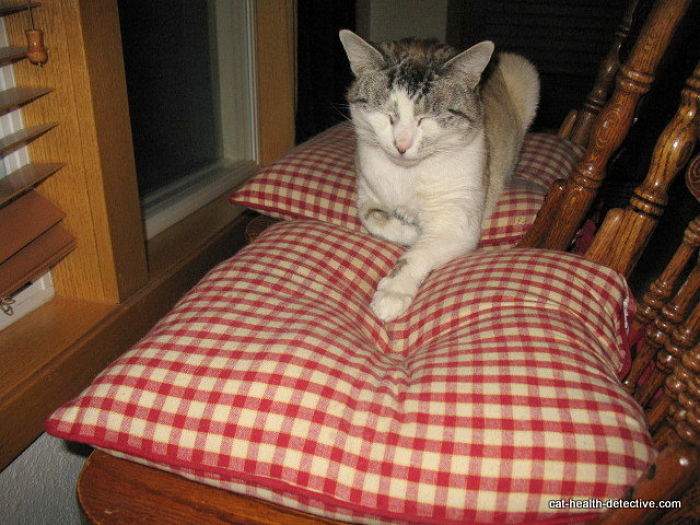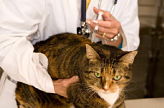Vet House Calls...Pros & Cons

Vet house calls have both pros and cons. Some people are housebound and others simply can’t make it to the vet during the normal office hours but many cities have vets who do come to you and your pet. However, not all home-based services are the same so you have to weigh the differences before opting to do it.
Some vet house calls services are a pick-up and drop-off service only, in which all vaccinations, routine exams, or treatments are administered in the clinic. Others are clinic-based vets who provide home visits for cat owners who are elderly, disabled, or just unable to go to the clinic.
Some vets have about 5% of their clients who require this
service and they restrict it to routine vaccinations and treatments for cats
who are in reasonably good health.
On the higher end of the home-visit spectrum are vets that own and operate a mobile home health care for companion animals and are 100% home based, traveling with adapted vans and medications, equipment, supplies and laptops (to maintain records and provide printouts of treatments and bills).
In these types of vet practices, routine checkups, vaccines, heartworm test, stool samples, and many low-grade illnesses, including skin, eye and ear, behavioral, blood work, and intestinal disorders can be done in the cat’s home. However, cats who need surgeries and X-rays are transported to a hospital with which the home veterinarian is affiliated.
Pros:
- Reducing trauma…for the scared or reluctant cat, the drive to and from the clinic (plus the actual visit) can be stressful. Arriving at the noisy clinic with other animals, antiseptic smells, barking dogs and strange people, can make a cat so frightened that even an otherwise calm cat bites and scratches.
- Clues visible to a
vet…in addition to reducing trauma, having your cat assessed and treated at
home offers behavioral and diagnostic advantages.
By seeing the cat in its normal surroundings a vet can often find clues
to the cause of the illness. For
instance, a vet visiting the home of a vomiting cat may see toxic plants, loose
or frayed carpeting edges with cat teeth marks.
In the case of a cat that suddenly starts urinating around the house,
the vet can check on the litter box situation and perhaps see a link.
- Diagnostic readings can be skewed by a clinic-scared cat because their hysterical state can have temperatures rising from a normal 1.5 degrees to 103 while blood count, white blood cell count, heart, and respiratory rates can also become elevated during the car trip, as can blood glucose levels, which is particularly troublesome when examining diabetic cats.
- Medical risks of
clinic visits include exposure to germs from other animals (like human doctor visits
when fellow patients are coughing and sneezing). Some cats in the later stages of diabetes and
kidney disease are just too old or fragile to be transported to a clinic. Or,
the owners are elderly, handicapped, housebound, so the availability of a
house-calling vet can mean the difference between keeping their pet and giving
it up. For owners with multiple cats,
getting to the vet clinic is even more difficult.
- Communications…explaining
diagnoses and follow-up care in the owner’s living room or kitchen is often a
better place. At a busy vet’s clinic,
owners sometimes forget questions they’d intended to ask and the vet has less
of an opportunity to repeat his instructions for medications or diet regimens. This is especially true for the elderly.
- Owners are partners of their cat’s care and treatment at home. Vets can find it easier to teach cat owners basic methods of restraint, such as holding the cat by the scruff of the neck or by the back legs so it can be injected via a particular vein. This owner focused treatment is the reason some emergency room vets start a traveling practice.
- Home visits allow more time to spend with the animal and humans. Another animal isn’t waiting for the vet’s attention. Plus, if the unpleasant need for feline euthanasia occurs, the grieving owner doesn’t face a waiting room full of strangers when exiting…it is more peaceful and dignified for the owner and pet.
Cons:
- For some cats their home is their sanctuary and it then becomes a bewildering experience to have a stranger enter that home and subject them to treatments or tests. Some homes have such things as vaulted ceilings and some frightened cats will escape to those elevated hideaways, making treatment difficult and even more traumatic. Cats are experiential learners who remember and associate certain things with bad experiences. To modify this behavior, some mobile vets reward cats with treats and praise after the treatment. Cats can learn to associate certain words, treats, even tones of voice with the end of their treatment, so that they can reestablish trust with their owner and the vet.
- Vet House Calls Expense….The main disadvantage of having vet house calls is the expense. Although fees vary all over the country for regular vet care, charges generally depend of the gravity of the cat’s condition, the individual costs of vaccines and other medications etc. For vet house calls you add the amount of time spent at the house, the distance traveled as well as specific treatments. Plus, house-care vets see fewer animals per day and driving time in major cities can be lengthy. Messages must be relayed while they are on the road or received via cell phones.
- A cat emergency can require an immediate transport to an animal hospital so cat owners should always have a backup plan for emergency cases such as a car accident, respiratory problems, bleeding, fractures or straining to urinate. Before emergencies happen owners should have already identified a local clinic and have the location, directions, and phone number accessible. If your cat’s usual vet is unavailable, emergency cases should be rushed to an animal hospital or clinic. Get the information before you need it!
Conclusions:
Calling for vet house calls for the first time when your cat badly needs care is a bad idea because it’s often difficult to find a new client’s house in an unfamiliar neighborhood, particularly when weather conditions lessen visibility.
Many house call vets are single or smaller scale practitioners and need plenty of notice for house calls (usually 3-4 days) and they tend to group calls geographically so the appointment can be set more efficiently. Whether consciously or not, a harried, lost vet, will transmit stress to a possibly agitated cat which makes the visit harder.
If your cat is likely to become frightened, it’s best to keep her in one small room. During the visit, the vet can then spend more time delivering treatment and explaining the diagnosis rather than chasing a runaway cat. Prepare your cat for the visit.
If your vet usually treats patients on the kitchen counter, then the owner can prepare ahead by putting the cat on the counter, giving it treats and petting it there, even pretending to examine it. Then when the real visit comes, the sensations and location aren’t strange.
Particularly for vets who don’t normally travel with a fully equipped van, be sure to describe the symptoms as accurately as possible so he/she can bring the appropriate medications and equipment to treat your cat. Remember that all vet house calls servicers agree that it’s not a “one size fits all scenario”.
Except in cases where the clinic trip is impossible or a hardship for the owner, the house call versus clinic choice is mainly determined by the behavior and stress levels of your cat.
How to find a Vet House Calls service:
- Your regular vet knows sometimes you need “at home help”
but can’t offer the service personally, but perhaps can refer you to a colleague
- Neighbor or friend referrals
- Phone book yellow pages
- Local pet clinics
- Google it
Related Articles......
Return from Vet House Calls to Cat Health Homepage
Having trouble finding what you need? Cat Health Index & Site Map
OR
Do you have a question to ask?...Questions
OR
Do you have a cat story to share?...Simply click here to go to that page!
Copyright@2010-2020 All rights reserved.Cat-health-detective.com
This website is information only. Consult a veterinarian for medical assistance

"Like Us" on Facebook
or...
"Like Us" here




















